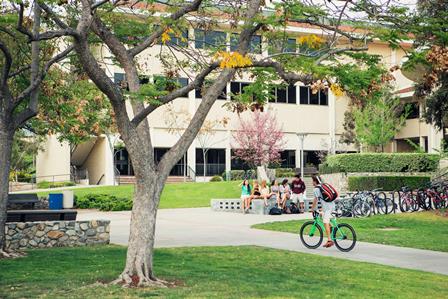History
Established in 1946, Claremont McKenna College (CMC) provides a liberal arts education with a curricular emphasis on economics, government, and public affairs. Unlike many other colleges that champion either the traditional liberal arts or the acquisition of professional and technical skills, CMC builds bridges between the two. By combining the intellectual breadth of the liberal arts with the more pragmatic concerns of public affairs, based on principles established by founding President George C. S. Benson, CMC helps students acquire the vision, skills, and values that they will need to lead society. Moreover, to support faculty and student scholarship, CMC houses ten on-campus research institutes, offering students and faculty unique opportunities to merge research, teaching, and learning.
From its founding, CMC was part of the unique plan conceived by James Blaisdell, then President of Pomona College, to form a group of institutions, called The Claremont Colleges, with common resources. Currently The Claremont Colleges are a consortium of five undergraduate colleges and two graduate institutions. Based on the Cambridge/Oxford model, The Claremont Colleges represent the only planned consortium in the United States offering students diverse opportunities and resources typically only found at much larger universities.
Originally founded as the Undergraduate College for Men in Claremont and incorporated in 1947 as Claremont Men’s College, CMC became coeducational in 1976 and changed its name to Claremont McKenna College in 1981 in honor of its most visionary and founding trustee, Donald C. McKenna. In the Fall of 2007, commensurate with its mission as an institution, the College established the Robert Day School of Economics and Finance, which now houses the economics, economics-accounting and financial economics programs. Claremont McKenna College also offers a specialized one-year Master of Arts Program in Finance to a select group of graduate students from around the nation and the world, as well as a dual degree BA/MA in Finance.
Mission
Claremont McKenna College is a highly selective, independent, coeducational, residential undergraduate liberal arts college. Its mission, within the mutually supportive framework of The Claremont Colleges, is to educate its students for thoughtful and productive lives and responsible leadership in business, government, and the professions, and to support faculty and student scholarship that contributes to intellectual vitality and the understanding of public policy issues. The College pursues this mission by providing a liberal arts education that emphasizes economics and political science, a professoriate that is dedicated to effective undergraduate teaching, a close student-teacher relationship that fosters critical inquiry, an active residential and intellectual environment that promotes responsible citizenship, and a program of research institutes and scholarly support that makes possible a faculty of teacher-scholars.
“To execute our mission, we seek to enroll a diverse student body, to recruit a diverse faculty and staff, and to place great value on respect for differences.”
- Mission Statement of Claremont McKenna College, as reaffirmed by the Board of Trustees on March 15, 2002
Learning Goals
The learning goals of a CMC education are to teach students transferable abilities including analytic skills, communication skills, and critical thinking skills, and to impart intellectual breadth and preparation for responsible leadership and citizenship through exposure to a variety of academic disciplines. Within the broader context of the College’s unique mission, each major discipline at CMC has set its own learning goals including substantial knowledge of the chosen field of study with identified student learning outcomes for assessment and evaluation. The faculty at CMC has established the following student learning outcomes for graduates which form the basis for assessment of the College’s general education program:
- Graduates will be able to critically analyze a particular issue, problem, or idea in depth and consider its elements.
- Graduates will be able to express themselves clearly, coherently, and convincingly both orally and in writing.
- Graduates will employ critical thinking and information literacy skills to complete projects that require integrating ideas and information from various sources.
- Graduates will be knowledgeable about the attributes of responsible leadership.
- Graduates will be able to effectively interpret, process, and analyze quantitative information and claims, as well as apply quantitative reasoning in appropriate contexts, such as data collection, decision making, and problem solving.
Accreditation
Claremont McKenna College is accredited by the Accrediting Commission for Senior Colleges and Universities of the Western Association of Schools & Colleges (WASC), an institutional accrediting body recognized by the Council on Postsecondary Accreditation and the U.S. Department of Education.
Western Association of Schools & Colleges
985 Atlantic Avenue, Suite 100
Alameda, CA 94501
510-748-9001
|